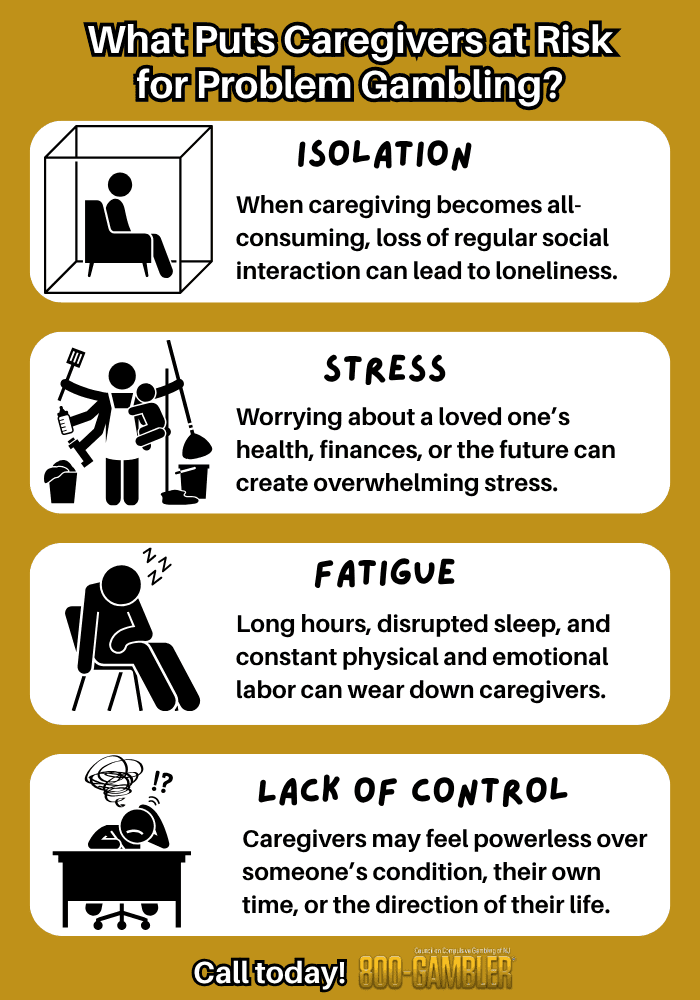Caregivers often carry the weight of the world on their shoulders. Whether they’re looking after an aging parent, a child with special needs, or a loved one with chronic illness, their daily responsibilities can be physically and emotionally overwhelming. While many caregivers demonstrate extraordinary strength and compassion, the constant pressure can push some to seek outlets to escape, even if only for a moment.
For some, gambling becomes that outlet. It offers a temporary break from stress, a distraction from worry, and even a rare chance to feel in control. But when gambling shifts from entertainment to emotional relief, the consequences can ripple through every part of a caregiver’s life.
Why Caregivers Are at Risk
Being a caregiver entails a unique blend of love, stress, duty, and emotional exhaustion. The demands of caregiving can lead to feelings of isolation, burnout, and a loss of personal identity. With so much focus on someone else’s needs, caregivers often neglect their own.
Online gambling platforms, lottery tickets, casino chance games, sports betting apps, and even gambling on horses are all relatively accessible and can seem like harmless ways to take the edge off. The emotional pull, however, can grow stronger over time. Winning may feel like a moment of success in an otherwise uncertain world. Even the possibility of a win can seem exciting compared to the daily routine of caregiving. When stress becomes constant, the appeal of gambling increases, and the risks start to build.
Emotional Triggers That Fuel Problem Gambling
Caregivers face many emotional hurdles that can increase the chances of turning to gambling as a way to cope:
- Loneliness: Many caregivers spend long hours alone and feel disconnected from friends or support networks.
- Exhaustion: Physical and mental fatigue can lower decision-making ability, making risky behavior feel more acceptable.
- Stress and worry: Gambling can seem like a quick escape from nonstop pressure and responsibilities.
- Loss of control: Caregivers may feel powerless over their loved one’s situation. Gambling can offer the illusion of control, providing a moment where outcomes feel up to chance, not circumstance.

These triggers don’t mean someone is flawed. They reflect the very real toll caregiving can take on mental and emotional health. Recognizing them can lead to better solutions.
How Gambling Affects the Caregiver Role
When gambling becomes a go-to emotional outlet, the ripple effects can impact every aspect of caregiving. What starts as stress relief can quickly evolve into an ongoing struggle.
Some of the most common consequences include:
- Neglected responsibilities: Time spent gambling may replace time spent attending to important tasks, such as medication schedules, appointments, or providing quality care.
- Financial strain: Caregiving already comes with expenses. Gambling can create even more financial stress, especially if it becomes difficult to stop.
- Emotional distance: Guilt, worry, or preoccupation with gambling can cause caregivers to withdraw emotionally from those they support.
- Isolation: Hiding gambling behaviors often leads to deeper feelings of shame, secrecy, and disconnection.
What may have felt like a release from stress can slowly become a new source of it.
Healthier Coping Strategies for Caregivers
The responsibilities caregivers face are real and deserve attention. Everyone needs an outlet, but not all coping methods are created equal. If gambling has become a routine response to stress, it’s worth considering healthier alternatives:
- Talk to someone. Opening up to a trusted friend, counselor, or confidential helpline can make a huge difference.
- Take intentional breaks. Even short walks, moments of quiet, or reading can help recharge your mind.
- Join a support group. Sharing experiences with others in similar roles can bring comfort and practical advice.
- Try new activities. Journaling, art, exercise, or gardening can offer joy and distraction without financial or emotional risk.
- Practice self-kindness. Let go of perfection. You are doing meaningful work, and you deserve care, too.
Small shifts in daily habits can reduce stress and lead to a more balanced caregiving experience.
You’re Not Alone — How 800-GAMBLER Can Help
If gambling has become a way you cope with the weight of caregiving, there is help. At 800-GAMBLER, we understand the emotional toll caregivers face. And we know how easily gambling can go from a brief escape to an ongoing struggle.
You don’t need to figure it all out on your own. Whether you’re just starting to feel concerned or have been dealing with this for a while, you can call us any time. Our support is free, confidential, and available around the clock. We’re here to listen, guide, and help you feel more in control again.
Get Help For Yourself or a Loved One Today
Caregiving is an act of love, but it comes with real challenges. If gambling has started to feel like your only outlet, you’re not alone. What feels like relief in the moment can create long-term difficulties for you and the people you care about. But support is just one step away.
Call 800-GAMBLER today. Our toll-free, confidential helpline is here to help you find healthier ways to cope, restore your sense of balance, and move forward with strength. You don’t have to choose between caring for others and caring for yourself.



